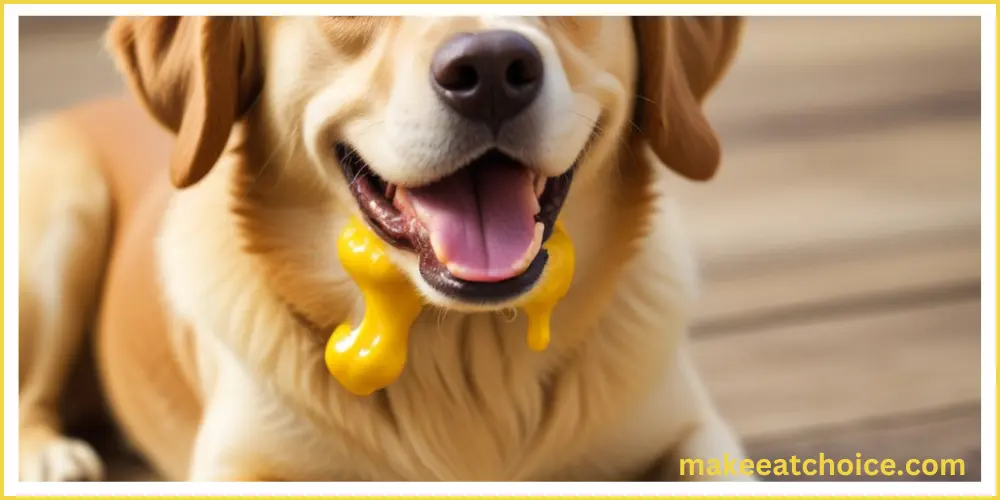
Mustard, a beloved condiment found on sandwiches, hotdogs, and with some pretzels, is a staple in many fridges. But can dogs eat mustard? The answer is more complex than it might seem, and understanding the nuances can save you from a potential trip to the vet.
In this comprehensive guide, we explore the ins and outs of feeding mustard to your furry friend, underline the risks, and share the actionable Dos and Don’ts, enabling dog owners to make informed decisions about their pets’ diets. We’ll also cover case studies, common FAQs, and much more, all in the pursuit of responsible pet care. Grab the leash and join us on this mustard-laden adventure!
Can Dogs Eat Mustard?
When sharing human foods with our furry friends, caution is always advised. Mustard, a common condiment in many households, poses risks for dogs. Mustard seeds, used in making mustard, contain toxic compounds to dogs. Dogs ‘ consumption of mustard can lead to gastrointestinal distress, including symptoms like vomiting and diarrhoea. While small amounts of mustard might not be immediately harmful, it’s best to avoid feeding dogs any foods containing mustard to prevent potential health issues.
It’s safer to steer clear of offering mustard to your canine companion. Opting for dog-friendly treats and a balanced diet tailored to their nutritional needs is the best way to ensure their health and well-being. When you doubt what to feed your dog, consult your veterinarian for professional advice.
Understanding Mustard: Composition and Varieties
Before determining can dogs eat mustard, we should know what’s in it. Mustard comes in various forms, from the classic yellow mustard to spicy brown and Dijon. Typically, the main ingredients include mustard seeds, vinegar, salt, and often other seasonings, depending on the variety. Depending on the seed and preparation methods, these can range from mild to hot.
Composition Breakdown
- Mustard Seeds: The primary ingredient is some varieties’ spicy taste and heat. It’s also known for its high nutritional value.
- Vinegar: A common preservative, this acidic ingredient brings a sour tang to mustard while increasing its shelf life.
- Salt: A staple in seasoning, it enhances flavours and acts as a natural preservative.
- Other Seasonings: In Dijon or speciality mustards, you may find additional herbs, spices, or sweeteners, which bolster taste but can present new considerations for your pet’s health.
Mustard Varieties and Their Pet Safety Implications
- Yellow Mustard: Most dog-friendly due to a milder flavour and fewer added ingredients.
- Spicy Brown and Dijon: These contain additives that could be problematic for dogs with certain health conditions.
- Honey Mustard: Not recommended for dogs due to the added sweeteners, particularly if they have diabetes.
- Hot Mustards: Best avoided as they can be too intense for canine palates and may cause gastrointestinal upset.
The Nutritional Value of Mustard
For humans, mustard can be a healthy choice. It’s low in calories and fat, and the mustard seed is an excellent source of selenium and omega-3 fatty acids. However, adding vinegar and salt in condiment form may not make it a dog’s best friend.
The Pros and Cons of Your Canine
- Pros: Mustard seeds can have some health benefits for dogs when consumed in small quantities, thanks to their antimicrobial properties and a good source of nutrients like phosphorus.
- Cons: The high sodium content in most commercial mustards is a red flag for canine health, especially for dogs with heart or kidney issues.
Why Is Mustard Bad for Dogs?
The potential issue with feeding mustard to dogs lies not in the mustard seed itself but in the added ingredients that could harm canine health.
Health Risks and Side Effects
- Sodium Overload: An excessive amount of mustard can lead to salt poisoning, causing symptoms like vomiting, diarrhoea, and even seizures or coma in severe cases.
- Xylitol: Rare, but some sweetened mustards may contain this sugar substitute, which is highly toxic to dogs.
- Digestive Distress: The vinegary or over-spiced varieties may cause gastrointestinal irritation.
What to Do if Your Dog Accidentally Eats Mustard
If Fido has gotten into the mustard, don’t panic. The first step is to assess how much they ate and what type it was. Note any unusual behaviour or symptoms.
Contacting Your Vet
If your dog consumed a significant quantity, has specific health conditions, or shows worrying symptoms, you should contact your vet immediately.

Recommended Actions
- Monitor: Keep an eye on your dog for any signs of distress.
- Hydration: Ensure they can access clean water to help flush out any excess salt.
- Regular Diet: If your dog has eaten a small amount, they can resume their regular diet if they’re not showing any symptoms after monitoring for a few hours.
Signs of Mustard Poisoning in Dogs
Depending on the size of the dog and the amount of mustard ingested, symptoms of mustard poisoning can vary in severity.
Common Symptoms
- Upset Stomach: This may include vomiting, diarrhoea, and abdominal pain.
- Excessive Thirst or Urination: Symptoms of salt poisoning include dehydration and increased water consumption.
- Weakness and Trouble Walking: In severe cases, dogs may experience tremors or develop a wobbly gait.
The Dos and Don’ts of Sharing Mustard with Your Dog
Decide if sharing a taste of mustard is the right choice for your dog, and ensure that you do so responsibly.
Dos:
- Limit Portions: A tiny dab of plain (unsalted and unsweetened) mustard is acceptable if you must share.
- Plain over Flavored: Opt for milder, plain mustard over spicy, flavoured, or sweetened varieties.
- Monitor Consumption: Monitor how your dog reacts to even small amounts of mustard.
Don’ts:
- Feed Spicy Mustards: These can be very uncomfortable for your pet and lead to an upset stomach.
- Regular Feeding: It’s best not to make mustard a regular part of your dog’s diet.
- Assume Tolerance: Even if your dog has had mustard once without issue, their tolerance can vary, so don’t assume it will be safe in the future.
Case Studies and Real-Life Experiences
Here, we compile several accounts from pet owners and veterinarians, sharing their experiences with dogs and mustard, whether intentional or accidental.
Success Stories
- Some dogs handle a dollop of mustard without any issues, but it’s always safer to approach with caution and moderation.
Cautionary Tales
- A pet owner recounts how their dog’s adventure into the picnic basket led to an upset stomach, emphasising the need for monitoring even after the fact.
Related:
FAQs
Understanding mustard’s impact on dogs’ health is essential for responsible pet care. Here are the answers to some common questions that may pop up.
What Happens if My Dog Eats Mustard?
The severity of the reaction can range from an upset stomach to more concerning symptoms, mainly if the mustard contains toxic ingredients like xylitol, a sugar alcohol used as a sweetener in some human foods.
Can Dogs Eat Mustard Flowers?
While the flowers aren’t inherently toxic, like other parts of the mustard plant, they are generally safe for dogs. However, little research exists on their consumption, so, as always, moderation and observation are key when sharing new foods with your pet.
Can Dogs Have Mustard or Mayo?
In small amounts and plain forms, condiments like mustard and mayo are generally safe for dogs. However, their nutritional value is minimal, so it should be separate from their regular diet.
Can Dogs Eat Mustard and Ketchup Together?
While a strange combination, if your dog gains access to a bit of mustard and ketchup, there is typically little reason for concern, as these condiments aren’t usually toxic to dogs. However, the excess salt, sugars, and spices could cause digestive issues, so watchfully.
Will A Little Mustard Hurt My Dog?
A small amount of plain, unsalted, unsweetened mustard is unlikely to cause harm, but it isn’t recommended to do this regularly. It’s essential to consider your pet’s overall diet and health status.
How Much Mustard is Toxic to Humans?
It’s estimated that adults would need to consume over a gram of pure mustard oil for it to be toxic, but beyond the negligible amount in standard food, toxicity concerns in humans aren’t typically relevant.
Conclusion:
Feeding your dog mustard isn’t as clear-cut as other foodstuffs. Can dogs eat mustard? Understanding the risks, ingredients, and potential reactions can help guide you as a responsible pet owner. If you err on caution and keep these guidelines in mind, you can better protect your furry friend, even when dealing with something as seemingly harmless as a dollop of mustard. Remember, moderation and observation are the keys to keeping your dog safe and healthy, and always consult your vet with specific questions or concerns.
References:
- By Purina, Can Dogs Eat Mustard?
- By Assistant, What can happen to a dog if it needs a small amount of mustard? Posted On 29 Feb 2024.



